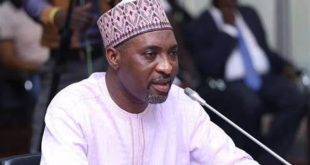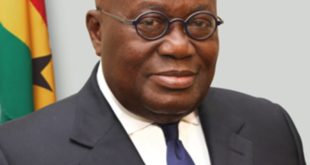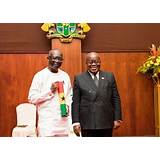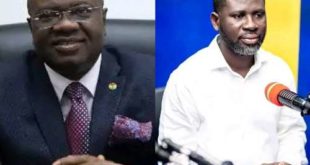By:brightwebtv.com/Martin awuku.
The Minister of State in Charge of Public Procurement, Hon. Sarah Adwoa Safo, has sent a signal to all professionals in the procurement business, cautioning them to be well disciplined as a new Code of Ethics which her outfit is spearheading will ruthlessly deal with those who will breach the guidelines.
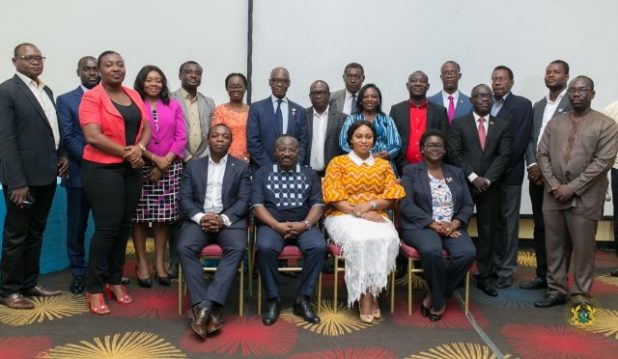
According to her, it is about time that procurement professionals be held accountable for the decisions and actions they take and legally justify them, stressing that anything contrary will warrant sanctions that will not be palatable to offenders.
“As procurement practitioners, we should be prepared to be accountable for the decisions we take and legally justify our official decisions and actions. Procurement officers shall not use or misuse their positions for private gain. This ethical standard when breached constitutes a serious breach of professional integrity”, she noted.
Hon. Safo who is also the deputy Majority Leader of the Parliament of Ghana made this observation, Wednesday, when she unveiled a Committee tasked with the responsibility to formulate a code of conduct that will set the highest ethical standards for benchmarking procurement practitioners, suppliers, members of the evaluation panel, members of the Tender Review Committee, members of the Board as well as contractors and service providers and proffer sanctions where necessary.
The Professional Ethics and Standards Committee for Procurement professionals which is chaired by Stella Aku Abbey, who is also the President of the Chartered Institute of Procurement & Supply, has three months to present its report.
Other members of the Committee include; Dr. Emmanuel Yaw Boakye, Technical Director, Ministry of Public Procurement, Mr. Solomon Sasu-Mensah, Director, Public Affairs, Ministry of Public Procurement, Ms. Naa Shika, Ministry of Public Procurement, Ing. Ebenezer K. Haizel, Ghana Institute of Engineers, Ing. Kofi E. Howard, Ghana Institute of Engineers, Surv. Humphrey T. Amegadoe, FGhIS, Ghana Institute of Surveyors, Surv. Helen Arthur, MGhIS, Ghana Institute of Surveyors, Mrs. Rhoda E. Appiah, Public Procurement Authority (PPA), Mr. David S. Amoah, PPA, Mr. Sam Acheampong (FCIPS), Chartered Institute of Procurement and Supply (CIPS), Mr. Collins Agyemang Sarpong, Ghana Institute of Procurement and Supply (GIPS) and Mr. Benjamin Baidoo, Ghana Institute of Procurement and Supply (GIPS).
The rest are Mr. Ebenezer Essilfie-Baiden, Head of Civil Service, Mr. Debrah Tetteh Odonkor, Civil Service, Mrs. Janet Ampadu Fofie, Public Service Commission, Mrs. Enerstina Oppong-Yeboah, Public Service Commission, Mrs. Eunice Osae, Local Government Service, Issaka Abdul –Jamil, Bernard Asamany, Health Service Supply Chain Practitioners Association Ghana (HESSCPAG), Edwin Adnortey Agbugbla, HESSCPAG, Daphne Lariba Nabila and a representative each from the Ministry of Finance and Ghana Bar Association (GBA).
It has its terms of reference enshrined in Section 86 of the Public Procurement Act (Act 663) as amended.
Section 86 (1) states that “The Board shall with the approval of the Minister, compile and publish a code of conduct that shall apply to each official of a procurement entity, the members of an evaluation panel, members of a tender review committee, members of the Board as well as tenderers, suppliers, contractors and consultants”.
Section 86 (2) also states that “The code of conduct shall address (a) Conflict of interest in procurement; (b) Measures to regulate matters concerning personnel responsible for procurement; (c) Declaration of interest in particular procurement; (d) Screening procedures and training requirements; and (e) Any other matter related to the ethics of procurement.
Section 86 (5) states that “The code of conduct shall promptly be made accessible to the public and shall be updated regularly as directed by the Board”.
Ghana is also enjoined by Article 8 (2) of the United Nations Convention Against Corruption to create guidelines or code of ethics or conduct to guide procurement professionals in the performance of their duties.
The said article states that “Each state party shall endeavor to apply within its own constitutional and legal systems, codes or standards of conduct for the correct, honourable and proper performance of public functions”.
This International Treaty is in tandem with the provisions of Article 284 of the 1992 Constitution which that “A public officer shall not put himself in a position where his personal interest conflicts or is likely to conflict with the performance of the functions of his office”.
To the public procurement Minister, breaches of the yet to be formulated and outdoored regulation will have disciplinary consequences or sanctions which may result in penalties such as demotion, failed promotion, blacklisting or outright dismissal, cancellation of a contract, suspension or a contract and any other appropriate remedies”.
The regulation once in operation, she emphasized, will serve the interest of the public and public officials by maintaining and strengthening the public’s trust and confidence in public institutions.
The Chief Executive Officer of Public Procurement Authority (PPA), Mr. A. B. Adjei on his part said he expects procurement professionals to conduct their activities in an ethical manner to ensure transparency and judicious use of state resources to achieve value for money.
“Unfortunately, none compliance and corrupt practices continue to dent the image of the procurement industry. It is even more disheartening to realize that procurement professionals who are expected to save the public purse end up conniving with themselves and sometimes misconducting themselves under the guise of the fear of threats or emotions, loss of the jobs or relegation to the background. Ethics is concerned with moral principles and values. Ethical approach in public procurement therefore implies exemplary approach to all procurement processes that cannot be questioned or criticized”, he noted.
He added “A strict adherence to the code of conduct and the fundamental principles of public procurement will result in increased efficiency in the procurement functions. Procurement operations will then become more effective and enhanced resulting in deduction in bribery and corruption and thereby achieving value for money”.
The event was graced by the Regional Director for CIPS, West Africa, Mr. Sam Acheampong.
Source: Ghana | Myjoyonline.com
 The Spot Of Latest Trending News And Leaks Log On For Latest Political News, Health Related Issues And More
The Spot Of Latest Trending News And Leaks Log On For Latest Political News, Health Related Issues And More


